
Lyon Sprague de Camp, better known as L. Sprague de Camp, was an American writer of science fiction, fantasy and non-fiction. In a career spanning 60 years, he wrote over 100 books, including novels and works of non-fiction, including biographies of other fantasy authors. He was a major figure in science fiction in the 1930s and 1940s.

Dave the Barbarian is an American animated television series created by Doug Langdale for Disney Channel. The show centers on a barbarian named Dave and his friends and family, who go on surreal Medieval-themed adventures. The series premiered on January 23, 2004 and ended on January 22, 2005, with a total of one season and 21 episodes. It was one of the short-lived Disney cartoon series.
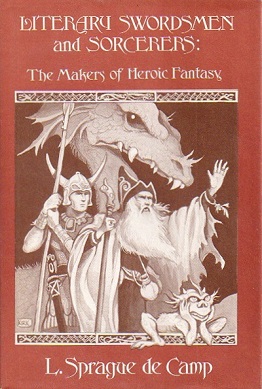
Literary Swordsmen and Sorcerers: The Makers of Heroic Fantasy is a work of collective biography on the formative authors of the heroic fantasy genre by L. Sprague de Camp (1907-2000), first published in 1976 by Arkham House in an edition of 5,431 copies. Nine chapters (2-10) are revisions from a series of ten articles, also titled "Literary Swordsmen and Sorcerers," that initially appeared in the magazine Fantastic and the fanzine Amra between 1971 and 1976. A French edition was issued in May 2010 under the title Les pionniers de la fantasy, and an ebook edition was issued in June 2014 by Gateway/Orion.

The Honorable Barbarian is a fantasy novel by American writer L. Sprague de Camp, the fifth and final book of his Novarian series. It is a sequel both to the "Reluctant King" trilogy and to the Novarian sequence's only short story, "The Emperor's Fan". It was first published in hardcover by Del Rey Books in July 1989, with a limited edition hardcover following from The Easton Press in its "Signed First Editions of Science Fiction" series in August of the same year. Another hardcover edition issued by Del Rey in conjunction with the Science Fiction Book Club appeared in January 1990. The first paperback edition was issued by Del Rey in May 1990. The novel has also been translated into French. An E-book edition was published as The Honourable Barbarian by Gollancz's SF Gateway imprint on September 29, 2011 as part of a general release of de Camp's works in electronic form.

The Goblin Tower is a fantasy novel by American writer L. Sprague de Camp, the first book of both his Novarian series and the "Reluctant King" trilogy featuring King Jorian of Xylar. It is not to be confused with the collection of poetry by the same title by Frank Belknap Long. De Camp's novel was first published as a paperback by Pyramid Books in 1968. It was reprinted by Del Rey Books in December 1983, July 1987, and July 1989. It was later gathered together with its sequels The Clocks of Iraz (1971) and The Unbeheaded King (1983) into the omnibus collection The Reluctant King. The first independent hardbound edition was issued by HarperCollins in 1987. An E-book edition was published by Gollancz's SF Gateway imprint on September 29, 2011 as part of a general release of de Camp's works in electronic form. The novel has been translated into French, Italian and German.

The Clocks of Iraz is a fantasy novel by American writer L. Sprague de Camp, the second book of both his Novarian series and the "Reluctant King" trilogy featuring King Jorian of Xylar. It was first published as a paperback by Pyramid Books in 1971. It was reprinted by Del Rey Books in December 1983, March 1984, and July 1989. It was later gathered together with the other books in the trilogy, The Goblin Tower (1968) and The Unbeheaded King (1983), into the omnibus collection The Reluctant King. An E-book edition was published by Gollancz's SF Gateway imprint on September 29, 2011 as part of a general release of de Camp's works in electronic form. The novel has been translated into Portuguese, Italian, French, German and Dutch.

The Best of L. Sprague de Camp is a collection of writings by American science fiction and fantasy author L. Sprague de Camp, first published in hardback by Nelson Doubleday in February 1978 and in paperback by Ballantine Books in May of the same year. The book was reprinted by Ballantine in May 1986. It was reissued in trade paperback and ebook editions by Phoenix Pick in December 2014. It has also been translated into German.

The Glory That Was is a science fiction novel by American writer L. Sprague de Camp. It was first published in the science fiction magazine Startling Stories for April, 1952, and subsequently published in book form in hardcover by Avalon Books in 1960 and in paperback by Paperback Library in March 1971. It has since been reprinted in paperback by Ace Books in July 1979 and Baen Books in April 1992, and in trade paperback by Phoenix Pick in September 2014. An E-book edition was published by Gollancz's SF Gateway imprint on September 29, 2011 as part of a general release of de Camp's works in electronic form; a second e-book edition was issued by Phoenix Pick in September 2014. The book has also been translated into Italian, German and Greek.

Conan the Usurper is a 1967 collection of four fantasy short stories by American writer Robert E. Howard and L. Sprague de Camp, featuring Howard's sword and sorcery hero Conan the Barbarian. Most of the stories originally appeared in the fantasy magazine Weird Tales in the 1930s. The book has been reprinted a number of times since by various publishers, and has also been translated into German, Spanish, Italian, Swedish and Dutch.

The Incorporated Knight is a fix-up fantasy novel by American writers L. Sprague de Camp and Catherine Crook de Camp, the first book in their sequence of two Neo-Napolitanian novels. Chapters 1-5 first appeared as L. Sprague de Camp's short stories "Two Yards of Dragon", "The Coronet", "Spider Love" and "Eudoric's Unicorn" in Flashing Swords!, The Magazine of Fantasy and Science Fiction and The Year's Best Fantasy Stories in 1976-1977. The complete novel was first published in hardcover by Phantasia Press in August 1987, and in paperback by Baen Books in September 1988, with a trade paperback edition, also from Baen, following in 1991. An E-book edition was published by Gollancz's SF Gateway imprint on September 29, 2011 as part of a general release of de Camp's works in electronic form.

The Reluctant King is the overall title of a trilogy of fantasy novels written by L. Sprague de Camp as part of his Novarian series, as well as the 1983 omnibus collection gathering the books together into one volume. The trilogy features de Camp's sword and sorcery hero King Jorian of Xylar, and is composed of The Goblin Tower (1968), The Clocks of Iraz (1971) and The Unbeheaded King (1983). The omnibus was first published in hardcover by Nelson Doubleday in 1983 as an offering for its Science Fiction Book Club, and was reissued in paperback by Baen Books in 1996.
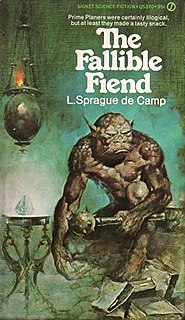
The Fallible Fiend is a fantasy novel by American writer L. Sprague de Camp, the third book of his Novarian series. It was first published as a two-part serial in the magazine Fantastic for December 1972 and February 1973, and subsequently expanded and revised for book publication. The novel was first published in book form as a paperback by Signet Books in 1973; it was later reprinted by Remploy (1974), Sphere (1978), Del Rey/Ballantine (1981), Baen (1992) and the Thorndike Press (2002). The Remploy edition was both the first British and first hardcover edition. An e-book edition was published by Gollancz's SF Gateway imprint on September 29, 2011 as part of a general release of de Camp's works in electronic form. It has also been translated into German and Italian.
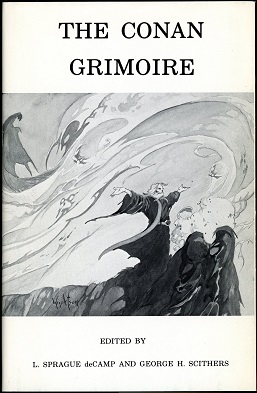
The Conan Grimoire is a 1972 collection of essays, poetry and fiction edited by L. Sprague de Camp and George H. Scithers, published in hardcover by Mirage Press. The essays were originally published as articles in Scithers' fanzine Amra. The book is a companion to Mirage’s previous two volumes of material from Amra, The Conan Reader (1968) and The Conan Swordbook (1969). Most of the material in the three volumes, together with some additional material, was later reprinted in two de Camp-edited paperback anthologies from Ace Books; The Blade of Conan (1979) and The Spell of Conan (1980).

The Novarian series is a sequence of fantasy stories by L. Sprague de Camp, published between 1968 and 1989. The series contains some of de Camp's most innovative works of fantasy, featuring explorations of various political systems, an inversion of the "rags to royalty" pattern characteristic of much heroic fantasy, a satiric look at the foibles of humanity through the eyes of a demon, and a consistently wry and ironic take on conventions of the genre that plays out by taking them to their logical conclusions. Another singular feature of the series is its frequent use of folk tales integrated into the plot to painlessly convey something of the background and history of the invented world. This device obviates the need for lengthy appendices, as in The Lord of the Rings.
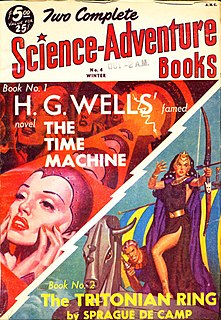
The Tritonian Ring is a heroic fantasy novel written by L. Sprague de Camp as part of his Pusadian series. It was first published in the magazine Two Complete Science Adventure Books for Winter, 1951, and first appeared in book form in de Camp's collection The Tritonian Ring and Other Pusadian Tales. Its first publication as a stand-alone novel was as a paperback by Paperback Library in 1968; the first hardcover edition was from Owlswick Press in 1977. An E-book edition was published as The Tritonian Ring and Other Pasudian [sic] Tales by Gollancz's SF Gateway imprint on September 29, 2011 as part of a general release of de Camp's works in electronic form.

The Unbeheaded King is a fantasy novel by American writer L. Sprague de Camp, the fourth book of his Novarian series and the third in the "Reluctant King" trilogy featuring King Jorian of Xylar. It was first published as a hardcover by Del Rey Books in March 1983 and later reprinted in paperback in December 1983 and July 1989 by the same publisher. It was later gathered together with the other books in the trilogy, The Goblin Tower (1968) and The Clocks of Iraz (1971), into the omnibus collection The Reluctant King. An E-book edition was published by Gollancz's SF Gateway imprint on September 29, 2011 as part of a general release of de Camp's works in electronic form.

"The Dark Eidolon" is a sword and sorcery short story by American writer Clark Ashton Smith, forming part of his Zothique cycle of stories. It was first published in Weird Tales in 1935 and has been variously republished, notably in the anthology The Spell of Seven, edited by L. Sprague de Camp.
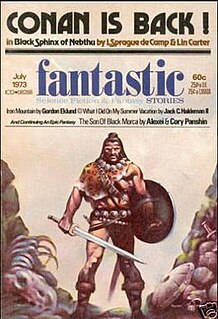
"Black Sphinx of Nebthu" is a fantasy short story by American writers L. Sprague de Camp and Lin Carter, featuring the fictional sword and sorcery hero Conan the Barbarian created by Robert E. Howard. It was first published in the July 1973 issue of the magazine Fantastic, and was first appeared in book form by Ace Books in the paperback collection Conan of Aquilonia in May 1977, which was reprinted several times through 1994. The first British edition was published by Sphere Books in October 1978.

"Shadows in the Skull" is a short story by American writers L. Sprague de Camp and Lin Carter, featuring the fictional sword and sorcery hero Conan the Barbarian created by Robert E. Howard. It was first published in the February 1975 issue of the magazine Fantastic, and first appeared in book form by Ace Books in the paperback collection Conan of Aquilonia in May 1977, which was reprinted several times through 1994. The first British edition was published by Sphere Books in October 1978.

Witch of the Four Winds is a fantasy novel by American writer John Jakes, featuring his sword and sorcery hero Brak the Barbarian.



















